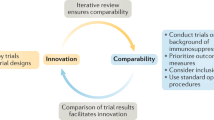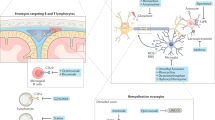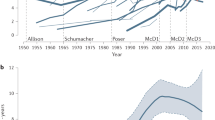Abstract
Multiple sclerosis (MS) is a chronic demyelinating disease of the CNS. Between 1987 and 1997, clinical trials of three preparations of recombinant interferon-β were conducted in patients with MS, ushering in a new therapeutic era. These medications have demonstrable benefits and seem to be safe; they represent an important advance in MS treatment. All three formulations of interferon-β had modest effects on relapses and short-term progression of disability, but the effects on MRI lesion parameters were more substantial. The benefits were greater in clinically isolated syndromes and relapsing–remitting MS than in secondary progressive MS. Although these drugs have been shown to be effective, however, their long-term impact on clinically relevant disability progression is uncertain, and there are many areas of controversy in the MS field regarding the use of these products. There is still a need for more effective treatments, which might include new agents or combination therapies.
Key Points
-
Interferons (IFNs) are naturally occurring proteins with antiviral, antiproliferative, antineoplastic and immunomodulatory actions
-
Between 1987 and 1997, clinical trials of three preparations of recombinant IFN-β were conducted in patients with multiple sclerosis (MS), ushering in a new therapeutic era
-
All three formulations of IFN-β have modest beneficial effects on relapses and short-term progression of disability; the effects on MRI lesion parameters are more substantial, but the clinical relevance of this finding remains unclear
-
The demonstrated benefit of IFN-β in mice with experimental autoimmune encephalomyelitis indicates that immunomodulatory or anti-inflammatory effects might be responsible for its therapeutic effects
-
Individuals treated with IFN-β can develop neutralizing antibodies to the medication that reduce its bioavailability, leading to reduced efficacy on relapse and MRI endpoints
This is a preview of subscription content, access via your institution
Access options
Subscribe to this journal
Receive 12 print issues and online access
$209.00 per year
only $17.42 per issue
Buy this article
- Purchase on Springer Link
- Instant access to full article PDF
Prices may be subject to local taxes which are calculated during checkout



Similar content being viewed by others
References
Whetten-Goldstein K et al. (1998) A comprehensive assessment of the cost of multiple sclerosis in the United States. Mult Scler 4: 419–425
Weinstock-Guttman B et al. (1995) The interferons: biological effects, mechanisms of action, and use in multiple sclerosis. Ann Neurol 37: 7–15
Jacobs L and Johnson KP (1994) A brief history of the use of interferons as treatment of multiple sclerosis. Arch Neurol 51: 1245–1252
Jacobs L et al. (1986) Multicentre double-blind study of effect of intrathecally administered natural human fibroblast interferon on exacerbations of multiple sclerosis. Lancet 2: 1411–1413
Weiner HL (1998) A 21 point unifying hypothesis on the etiology and treatment of multiple sclerosis. Can J Neurol Sci 25: 93–101
Trapp BD et al. (1998) Axonal transection in the lesions of multiple sclerosis. N Engl J Med 338: 278–285
Trapp BD et al. (1999) Neurodegeneration in multiple sclerosis: relationship to neurological disability. Neuroscientist 5: 48–57
Yu M et al. (1996) Interferon-β inhibits progression of relapsing-remitting experimental autoimmune encephalomyelitis. J Neuroimmunol 64: 91–100
Rudick RA et al. (1999) Cerebrospinal fluid abnormalities in a phase III trial of Avonex (IFNβ-1a) for relapsing multiple sclerosis. J Neuroimmunol 93: 8–14
Karp CL et al. (2001) Interferon-β in multiple sclerosis: altering the balance of interleukin-12 and interleukin-10? Curr Opin Neurol 14: 361–368
Ransohoff RM (2003) Biological responses to type I interferons: relationship to therapeutic effects in multiple sclerosis. In Multiple Sclerosis Therapeutics, 363–378 (Eds Cohen JA and Rudick RA) London: Martin Dunitz Ltd
The IFNB Multiple Sclerosis Study Group (1993) Interferon β-1b is effective in relapsing-remitting multiple sclerosis: I. Clinical results of a multicenter, randomized, double-blind, placebo-controlled trial. Neurology 43: 655–661
Friedman LM et al. (1998) Fundamentals of Clinical Trials, 361. New York: Springer-Verlag Inc.
Milanese C et al. (2003) A post-marketing study on interferon β 1b and 1a treatment in relapsing-remitting multiple sclerosis: different response in drop-outs and treated patients. J Neurol Neurosurg Psychiatry 74: 1689–1692
The IFNB Multiple Sclerosis Study Group and The University of British Columbia MS/MRI Analysis Group (1995) Interferon β-1b in the treatment of multiple sclerosis: final outcome of the randomized controlled trial. Neurology 45: 1277–1285
Jacobs LD et al. (1996) Intramuscular interferon β-1a for disease progression in relapsing multiple sclerosis. Ann Neurol 39: 285–294
PRISMS Study Group (1998) Randomized double-blind placebo-controlled study of interferon β-1a in relapsing/remitting multiple sclerosis. Lancet 352: 1498–1504
PRISMS Study Group and the University of British Columbia MS/MRI Analysis Group (2001) PRISMS-4: Long-term efficacy of interferon-β-1a in relapsing MS. Neurology 56: 1628–1636
The Once Weekly Interferon for MS Study Group (1999) Evidence of interferon β-1a dose response in relapsing-remitting MS: the OWIMS Study. Neurology 53: 679–686
Clanet M et al. (2002) A randomized, double-blind, dose-comparison study of weekly interferon β-1a in relapsing MS. Neurology 59: 1507–1517
Clanet M et al. (2004) Interferon β-1a in relapsing multiple sclerosis: four-year extension of the European IFN β-1a dose-comparison study. Mult Scler 10: 139–144
Rice GPA et al. (2001) Interferon in relapsing-remitting multiple sclerosis. Cochrane Database Syst Rev 4: CD002002
Sibley WA et al. (1994) Interferon β treatment of multiple sclerosis [reply to letters]. Neurology 44: 188–190
Comi G et al. (2001) Effect of early interferon treatment on conversion to definite multiple sclerosis: a randomised study. Lancet 357: 1576–1582
Jacobs LD et al. (2000) Intramuscular interferon β-1a therapy initiated during a first demyelinating event in multiple sclerosis. CHAMPS Study Group. N Engl J Med 343: 898–904
Beck RW et al. (2002) Interferon β-1a for early multiple sclerosis: CHAMPS trial subgroup analyses. Ann Neurol 51: 481–490
Filippi M et al. (2004) Interferon β-1a for brain tissue loss in patients at presentation with syndromes suggestive of multiple sclerosis: a randomised, double-blind, placebo-controlled trial. Lancet 364: 1489–1496
Lublin FD and Reingold SC (1996) Defining the clinical course of multiple sclerosis: results of an international survey. Neurology 46: 907–911
Filippi M et al. (1995) Brain magnetic resonance imaging and multimodal evoked potentials in benign and secondary progressive multiple sclerosis. J Neurol Neurosurg Psychiatry 58: 31–37
Tortorella C et al. (2000) A magnetization transfer histogram study of normal-appearing brain tissue in MS. Neurology 54: 186–193
Filippi M et al. (1999) Comparison of MS clinical phenotypes using conventional and magnetization transfer MRI. Neurology 52: 588–594
Secondary Progressive Efficacy Clinical Trial of Recombinant Interferon-β-1a in MS (SPECTRIMS) Study Group (2001) Randomized controlled trial of interferon-β-1a in secondary progressive MS: clinical results. Neurology 56: 1496–1504
European Study Group on interferon β-1b in secondary progressive MS (1998) Placebo-controlled multicentre randomised trial of interferon β-1b in treatment of secondary progressive multiple sclerosis. Lancet 352: 1491–1497
The North American Study Group on Interferon β-1b in Secondary Progressive MS (2004) Interferon β-1b in secondary progressive MS: Results from a 3-year controlled study. Neurology 63: 1788–1795
Andersen O et al. (2004) Multicentre, randomised, double blind, placebo controlled, phase III study of weekly, low dose, subcutaneous interferon β-1a in secondary progressive multiple sclerosis. J Neurol Neurosurg Psychiatry 75: 706–710
Li DK et al. (2001) Randomized controlled trial of interferon-β-1a in secondary progressive MS: MRI results. Neurology 56: 1505–1513
Cohen JA et al. (2002) Benefit of interferon β-1a on MSFC progression in secondary progressive MS. Neurology 59: 679–687
Cohen JA et al. (2001) Use of the multiple sclerosis functional composite as an outcome measure in a phase 3 clinical trial. Arch Neurol 58: 961–967
Fischer JS et al. (2001) Administration and scoring manual for the Multiple Sclerosis Functional Composite Measure (MSFC). New York: Demos Medical Publishing
Kappos L et al. (2004) Interferon β-1b in secondary progressive MS: A combined analysis of the two trials. Neurology 63: 1779–1787
Leary SM et al. (2003) Interferon β-1a in primary progressive MS: an exploratory, randomized, controlled trial. Neurology 60: 44–51
Panitch H et al. (2002) Randomized, comparative study of interferon β-1a treatment regimens in MS: the EVIDENCE Trial. Neurology 59: 1496–1506
Durelli L et al. (2002) Every-other-day interferon β-1b versus once-weekly interferon β-1a for multiple sclerosis: results of a 2-year prospective randomised multicentre study (INCOMIN). Lancet 359: 1453–1460
de la Fuente-Fernandez R et al. (2001) Expectation and dopamine release: mechanism of the placebo effect in Parkinson's disease. Science 293: 1164–1166
de la Fuente-Fernandez R et al. (2002) The placebo effect in neurological disorders. Lancet Neurol 1: 85–91
Rask C et al. (2002) Comparative Study of Rebif to Avonex and Orphan Exclusivity. Rockville, MD: Department of Health and Human Services
Schwid SR et al. (2005) Enhanced Benefit of Increasing Interferon β-1a Dose and Frequency in Relapsing Multiple Sclerosis: the EVIDENCE Study. Arch Neurol 62: 785–792
Bertolotto A et al. (2002) Differential effects of three interferon betas on neutralising antibodies in patients with multiple sclerosis: a follow up study in an independent laboratory. J Neurol Neurosurg Psychiatry 73: 148–153
Bertolotto A et al. (2003) Persistent neutralizing antibodies abolish the interferon beta bioavailability in MS patients. Neurology 60: 634–639
Polman C et al. (2003) Neutralizing antibodies during treatment of secondary progressive MS with interferon β-1b. Neurology 60: 37–43
Sorensen PS et al. (2003) Clinical importance of neutralising antibodies against interferon beta in patients with relapsing-remitting multiple sclerosis. Lancet 362: 1184–1191
Kappos L et al. (2005) Neutralizing antibodies and efficacy of interferon β-1a: a 4-year controlled study. Neurology 65: 40–47
Francis GS et al. (2005) Interferon β-1a in MS: results following development of neutralizing antibodies in PRISMS. Neurology 65: 48–55
Lublin FD and Reingold SC (2001) Placebo-controlled clinical trials in multiple sclerosis: ethical considerations. Ann Neurol 49: 677–681
Rudick RA et al. Estimating long-term effects of disease-modifying drug therapy in multiple sclerosis patients. Multiple Sclerosis, in press
Marrie RA and Cohen JA (2003) Interferons in secondary progressive multiple sclerosis. In Multiple Sclerosis Therapeutics, 347–362 (Eds Cohen JA and Rudick RA) London: Martin Dunitz Ltd
Acknowledgements
This study was supported in part by the National Institutes of Health, National Institute of Child Health and Human Development, Multidisciplinary Clinical Research Career Development Programs Grant K12 HD049091.
Author information
Authors and Affiliations
Corresponding author
Ethics declarations
Competing interests
Dr Rudick has received within the past 3 years honoraria for advisory panels or speaking from Biogen Idec, Teva, Vertex, Millenium, and the American Academy of Neurology. Dr Rudick was an investigator in the MSCRG study of Avonex discussed in this review. That study was sponsored by NIH (NINDS) and by Biogen, Inc. Dr Rudick's current research is supported by the National Institutes of Health (NINDS, NICHD, and NCRR), the National Multiple Sclerosis Society, the Nancy Davis Foundation, and Biogen Idec. Dr Rudick has no equity or ownership positions in any company related to this review.
Supplementary information
Supplementary Table 1
(PDF 6 kb)
Rights and permissions
About this article
Cite this article
Marrie, R., Rudick, R. Drug Insight: interferon treatment in multiple sclerosis. Nat Rev Neurol 2, 34–44 (2006). https://doi.org/10.1038/ncpneuro0088
Received:
Accepted:
Issue Date:
DOI: https://doi.org/10.1038/ncpneuro0088
This article is cited by
-
Immunomodulatory functions of type I interferons
Nature Reviews Immunology (2012)
-
Single-nucleotide polymorphisms in HLA- and non-HLA genes associated with the development of antibodies to interferon-β therapy in multiple sclerosis patients
The Pharmacogenomics Journal (2012)
-
A critical appraisal of treatment decisions in multiple sclerosis—old versus new
Nature Reviews Neurology (2011)
-
From Stem Cells to Oligodendrocytes: Prospects for Brain Therapy
Stem Cell Reviews (2007)



